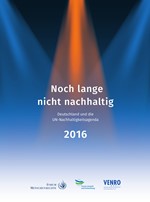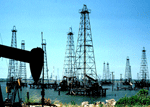Social Watch E-Newsletter - Issue 274 - September 16, 2016
Published on Fri, 2016-09-16 13:33
 |
| Issue 274 - September 16, 2016 |
|
|
Social Watch reports
Spotlight report on the 2030 Agenda
|
|
|
| |
|
| |
Sustainable Germany - a long way to go
|
| |
|
| |
 |
The 2030 Agenda and its 17 Sustainable Development Goals (SDGs) comprises a number of goals which concern the internal situation in Germany. Among these are goals which derive from the human rights obligations, such as in the areas of education, health and social security. Examples include reducing the proportion of poor people in Germany by half and increasing the proportion of young people who complete secondary education.
Other goals address the external effects of German politics and economy. They demand domestic measures which also have immediate impacts for people in the countries of the South. These include goals for reducing resource use, for changing unsustainable consumption and production patterns, but also for the relationship to migrants and refugees.
Still other goals go to Germany’s international responsibility and solidarity. Besides the traditional development policy obligations the corresponding targets concern all areas of structural policies, particularly trade, investment and finance.
In September 2015, when the United Nations, personified by the heads of state and government of its Member States, solemnly adopted the 2030 Agenda for Sustainable Development experienced observers increasingly had a sense of “déjà vu”. Hadn’t we been here before? However, sober political realism demands taking the governments at their word without illusions and using the 2030 Agenda as one more argument in the political debate in order to call for outstanding measures for more sustainability and to push them through politically even against opposition. Civil society is now doing this all over the world. We are, too. Read more
|
| |
|
| |
|
| |
Azerbaijan: The impact of oil prices on sustainable development
|
| |
|
| |

Photo: Google
|
In Azerbaijan reduced budget revenues and cuts in government spending are the result of the decline in crude oil prices, the main export of the country. The Social Watch coalition in Azerbaijan examines how these constraints can also hamper the financing of sustainable development initiatives. As crude oil prices have tumbled, a worsening of the country’s fiscal balance could gradually lead to an increase in the public debt burden and threaten fiscal sustainability in the long term. Azerbaijan’s sovereign wealth fund, SOFAZ, now has very limited profits from the sale of oil, and will contribute less to the fiscal revenues of the state as a consequence. The national state-owned oil-gas company, SOCAR, temporarily cancelled its plans for a new oil-gas refining and petrochemical complex because of the rapid fall in crude oil prices. However, at the same time, the new low oil price environment also offers an opportunity to boost a new wave of fiscal and public administration reforms in Azerbaijan. Read more
|
| |
|
| |
|
| |
Social Watch coalitions around the world are contributing their assessments and reports to the global Social Watch report 2016, under the overall theme Goals for 2030... and obstacles to getting there. The Social Watch network thus joins the current global discussions around a set of Sustainable Development Goals (SDGs) and on a new development framework and the need for civil society monitoring.
The Social Watch national platforms are independent coalitions of civil society organizations struggling for social and gender justice in their own countries. The Social Watch network has been publishing since 1996 yearly reports on how governments implement their international commitments to eradicate poverty and achieve equality between women and men.
|
| |
|
| |
|
| |
The World Trade Organisation (WTO) should mainstream human rights into all of its activities and issue directives to the dispute settlement panels so that human rights treaty violations are not adversely affected.
This is one of the main recommendations highlighted by the UN Independent Expert on the promotion of a democratic and equitable international order, Mr Alfred de Zayas (United States), in his report to the Human Rights Council, which is currently holding its regular thirty-third session in Geneva.
"It is high time to mainstream human rights into all trade agreements and World Trade Organisation (WTO) rules and regulations, so that trade representatives and dispute-settlers know that trade is neither a 'stand-alone' regime nor an end in itself," the rights expert said in presenting his report to the Council on Tuesday (13 September). Read more
|
|
| |
|
| |
|
| |
The Fed Up campaign reached new heights last month when 120 community leaders and organizers from around the country sat down with ten of the Federal Reserve's Presidents and Governors for an unprecedented on-the-record conversation about monetary policy and Fed governance in Jackson Hole, Wyoming.
Workers and community leaders from mostly Black and Latino communities in all twelve of the Federal Reserve's regional districts left their homes and families to travel to Jackson Hole to tell the Fed that the economy is still not working for their communities. They all belonged to the Fed Up campaign, a coalition of labor unions and community groups that came together two years ago to advocate for a more democratized Federal Reserve. Read more
|
|
| |
|
|
|
| |
|
SOCIAL WATCH IS AN INTERNATIONAL NGO WATCHDOG NETWORK MONITORING POVERTY ERADICATION AND GENDER EQUALITY Social Watch >>
Social Watch E-Newsletter For comments, sugestions, collaborations contact us at: socwatch@socialwatch.orgTo stop receiving this newsletter send a message with the subject "unsubscribe" to: socwatch@socialwatch.org |
|
|
|
SUSCRIBE TO OUR NEWSLETTER
Submit
|
